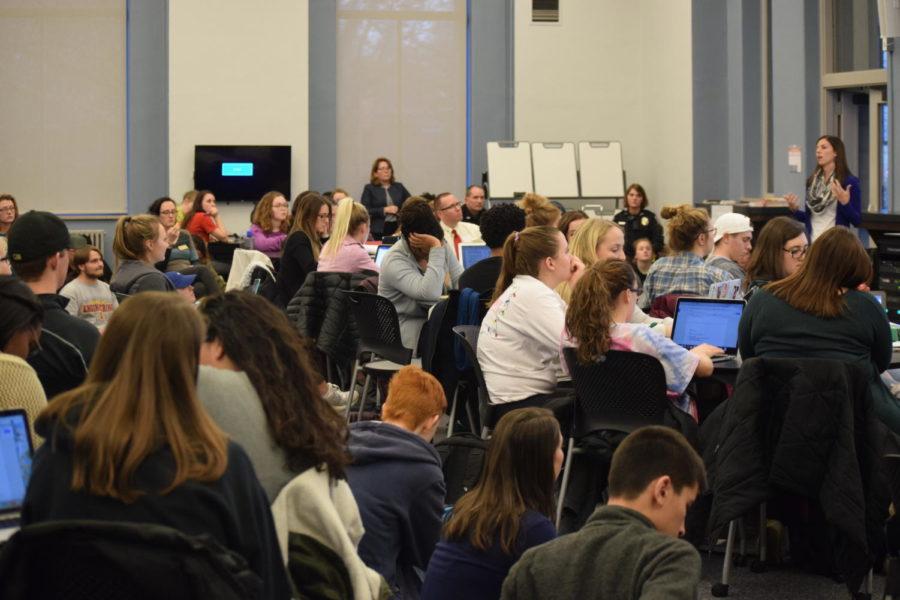Campus conversation hopes to silence mental health stigmas
November 30, 2017
The fifth installment of campus conversations took place Thursday in 198 Parks Library and centered around mental health and suicide awareness. The goal of the event was to end the silence and stigmas around mental health and suicide.
Two officers, Officer Jessica Spada and Officer Cassie Edwards, from the Iowa State University Police Department, gave a lecture about their experiences in their roles as resources for mental health.
Spada said that due to working third shift at the department, her and Edwards receive most of the calls for welfare checks.
According to data collected from National Alliance on Mental Illness (NAMI), the top mental health concern among college students was depression, which affects 27 percent of students. Bipolar disorder was the second highest at 24 percent. Other illnesses such as borderline personality disorder and eating disorder affect 12 percent of students. Anxiety was the lowest with 11 percent of students affected.
“Here at Iowa State the most common mental health disorder is major depression,” Spada said. “Forty-five percent of our students are diagnosed with it.”
Spada spoke of the statistics that the police department gathered of the welfare calls and attempted suicides that occurred during the 2015-2016 school year, 2016-2017 school year and the 2017-2018 school year.
Spada said that for the 2015-2016 school year there were 177 welfare checks and eight attempted suicides reported by the police department.
For the 2016-2017 school year, there were 232 welfare checks and 11 attempted suicides.
For the current school year, the department reported 109 welfare checks and six attempted suicides.
“We don’t necessarily see this as a bad thing,” Spada said. “People are becoming more comfortable with calling us.”
Spada said that she likes to be the one to knock on an individual’s door, make contact and ensure the individual’s safety.
Edwards said that the police department partnered with the NAMI chapter at Iowa State to create the Bandanna Project.
Individuals and officers on campus were selected to wear a green bandanna. The bandanna signifies that the person wearing it is safe to approach about mental health issues and be provided information about resources on campus.
“It’s designed to spread awareness of resources for those who have mental health illnesses,” Edwards said.
Edwards said that the bandanna is also a sign that the individuals do not subscribe to the stigmas surrounding mental health and it allows those who are affected by mental health concerns to know that they have someone to talk to.
Edwards and Spada gave tips for people to help those in distress such as standing in an open stance, talking slowly and calmly, and expressing what you are observing about the person’s behavior or demeanor.
The officers suggested that people not overcrowd the person or act surprised. The officers suggested suspending emotions, not to validate hallucinations if the person is having hallucinations and, finally, to have empathy.
Edwards and Spada spoke of the national suicide hotline 1-800-273-8255 and local hotlines such as the crisis text line.
They also spoke of campus resources such as Student Wellness, Student Counseling, NAMI, Suicide Awareness Organization and the Iowa State chapter of To Write Love on Her Arms, a non-profit group dedicated to assisting people struggling with depression, addiction, self-harm and suicide.
“One thing we encounter is so many friends and professors are afraid to contact us,” Spada said.
Spada made a welfare check Wednesday night after an individual contacted the police department regarding alarming text messages they received.
“They almost didn’t call us because they knew how their friend would react,” Spada said.
Spada urged attendees to not be afraid of contacting the police.
“We’ll never tell the person [we were called about], ‘oh by the way Larry contacted us, it’s his fault we’re here.’ We’ll never do that,” Spada said.
Kristen Sievert, staff psychologist for Student Counseling Services at Iowa State gave a follow-up presentation to assist people to be able to help support an individual struggling with mental health concerns.
Sievert spoke of the acronym “RESPOND,” which stands for recognize the signs, empathize, share your concerns, pose direct questions, offer hope, navigate policies and resources, and finally, do self-care.
The initiative is part of a training that Iowa State faculty and staff have completed and soon will become available for students to participate in.
Following Sievert’s presentation, attendees gathered in small groups reflecting on presentations and new information they had learned. While in the small groups, many shared personal stories of experiencing mental health concerns or of loved ones.
The conversation was a result of between Sievert, Spada and the director of student wellness Mark Rowe-Barth discussing initiatives to bring awareness to suicide prevention.
“It’s always been a focus point [to us],” said Brian Vanderheyden, student wellness manager, about suicide awareness and mental health.
Vanderheyden praised the coalition between Parks Library, Student Counseling Services, Student Wellness and the Office for Diversity and Inclusion.
Vanderheyden said that the coalition has created a stronger team.
“I think that’ll continue, it’s a pretty strong partnership,” Vanderheyden said.
















